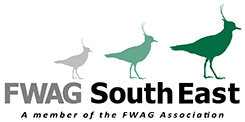


FWAG South East Projects
Cranleigh Waters Farmer Engagement
Since 2016 FWAG South East has been working with farmers and land managers to improve water quality in the Cranleigh Waters catchment in Surrey, in a project funded by Thames Water.
The project aims to reduce levels of Metaldehyde in the many surface waters that feed into the River Wey in this clay catchment.
Problem
Metaldehyde from slug pellets applied to farmland in autumn and winter can run off into drinking water sources. Thames Water is legally required to ensure concentrations remain below 0.1 parts per billion in treated water supplies.
The Cranleigh Waters catchment had been a known Metaldehyde hotspot where concentrations in watercourses had frequently exceeded the drinking water standard.
The current engagement project follows earlier work advisers Shaun Page and Paul Cobb did on Metaldehyde stewardship, including research and walkover studies to identify likely users of Metaldehyde.
Approach
The information gathered enabled us to start building knowledge of the key arable farmers, contractors and agronomists in Cranleigh Waters, as well as many others who own or manage land in the catchment.
FWAG South East’s role now is to promote a product substitution project (PSP) replacing Metaldehyde with Ferric phosphate in slug control. Thames Water pay £1/product kg subsidy anywhere Ferric phosphate is used – this can be part farm or even part field.
We send out information on how to register and claim, as well as monthly water quality updates in autumn/winter, and a newsletter. Farmers taking part are eligible for free on-farm advisory visits.
In a separate trial, Thames Water has been investigating whether swales can be effective in reducing the concentration of Metaldehyde and other pesticides reaching watercourses. A swale is an artificial vegetated collection area designed to intercept and retain any contaminants in water running off land.
Results
In the 2016/17 season, there were no sample results above the drinking water standard all autumn/winter. In the next two seasons there were some detections above the limit, followed by 2019/20 with no results above the limit. So far in 2020/21 the drinking water standard has not been exceeded.
The swale results for Metaldehyde have been inconclusive, but other pesticides of interest such as propyzamide have provided more promising results.
There are actually very few farmers or contractors in the catchment growing arable crops, and we have built up a relationship with the key ones. Over the years these have moved towards using Ferric phosphate instead of Metaldehyde, usually without claiming the subsidy. Of course you never get a response from everyone!
Future opportunities
The end of Greening opens up more opportunities under the Countryside Stewardship scheme that will help with water quality and other land management issues, and water quality will be a ‘public good’ supported by the future Environmental Land Management scheme.
Meanwhile, all outdoors use of Metaldehyde will be banned after 31 March 2022. Thames Water stresses that this does not affect the Metaldehyde substitution project in Cranleigh Waters, and it is committed to working with farmers to keep Metaldehyde out of water, and the PSP, until the ban comes in.





